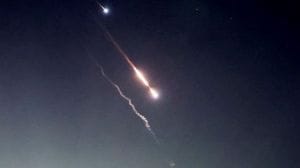- India
- International
The vast grey in the blue
In the first 5 months of the ongoing fishing season, as many as 246 fishermen of Gujarat on board 41 boats were arrested by Pakistan.
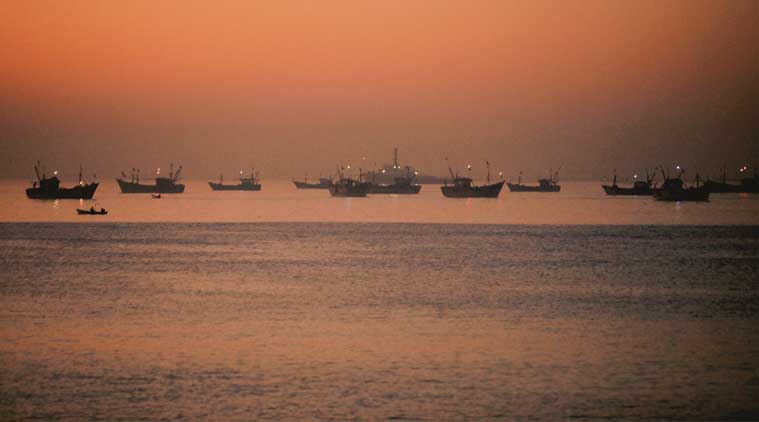 Boats, painted in garish shades of red, green and blue, with equally vibrant flags perched on them, gently nudge each other in the shallow waters of the sea.
Boats, painted in garish shades of red, green and blue, with equally vibrant flags perched on them, gently nudge each other in the shallow waters of the sea.
Last week’s Pakistani boat incident may have rocked the rest of the country, but off the Porbandar coast, where the boat went up in flames after a chase by the Coast Guards, life goes an as usual — with an added layer of security and fear.
Photographs: Javed Raja
At the crack of dawn, the air along the coast of Porbandar in western Gujarat is heavy with the smell of raw fish. Fishermen, who’ve just got off their trawlers, unload their catch. Some proudly display pomfret and lobsters — rare and priciest in the market. Most, though, quietly sell off their ribbonfish, dhol, squid and cuttlefish to traders waiting to load the catch onto their chakdas — motorbikes with colourful trailers attached to them — and take it to the Old Port area for sorting.
At the Porbandar port, it is business as usual. Boats, painted in garish shades of red, green and blue, with equally vibrant flags perched on them, gently nudge each other in the shallow waters of the sea. Fishermen load ice, diesel, fresh water and ration onto these boats, enough to last them two weeks on the sea. Carpenters lug heavy logs and cut them to build new trawlers, others apply a fresh coat of lime and ghee to the boats, and still others knit fishing nets of varying sizes.
And yet, beneath this apparent normalcy is a sense of unease and caution. Amidst the plainclothed fishermen and traders are a dozen uniformed men who patrol the shores armed with guns, batons and walkie-talkies. They are Gujarat police’s marine commandos, tasked with looking out for any suspicious activity along the coast. At the four check posts in Porbandar, head constables have been replaced with higher-ranking sub-inspectors.
Ever since a Pakistani boat went up in flames off the Porbandar coast on New Year’s Eve, following a chase by a Coast Guard ship, the Gujarat Police is taking no chances.
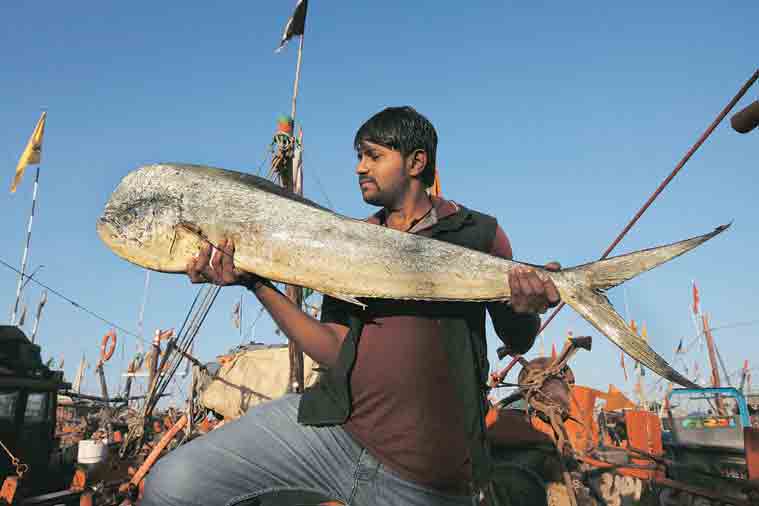

The most striking security measure on the sea are the three black patrol boats of the the Navi Bandar Marine police station that intercept every boat three-four nautical miles before the coast. Once intercepted, the crew on the patrol boat — two marine commandos, two constables, one master and one navigator — ask the fishermen to show their identity cards, the registration certificate of their trawler, and their fishing licence. They then get on to the trawlers and check the compartments inside for any suspicious material. No boat escapes this frisking.
This security check on the sea is, however, not a new measure. It has been in place for long but was executed “randomly” until the Pakistani boat explosion. “Until December 31, 2014, the marine police would only conduct random security checks because the traffic is very high — 1,000 boats sail in and out every day. But for the last one week, we have been searching every vessel to avoid any untoward incident. Our men even check the cold-rooms of boats,” says Dinesh Parmar, Porbandar Superintendent of Police.
Entry into the Porbandar port, which exports Rs 800 crore worth of fish and fish products every year, has been restricted since January 1. Armed guards keep a watch at its entry gate while Rajratan, the Coast Guard ship which intercepted the Pakistani trawler, is parked a few hundred metres away. “We have 34 guards to secure the port complex. The alert level is set at the highest and we are not letting outsiders visit the port,” says a senior officer of the Gujarat Maritime Board.
The Coast Guard has also warned fishermen to stay 20 nautical miles short of the International Maritime Boundary Line (IMBL). In normal circumstances, the no-fishing zone is five nautical miles within the IMBL.
But every morning, as the ordinary fisherman sets sail, he knows he will have to dare that boundary line till his luck runs out.
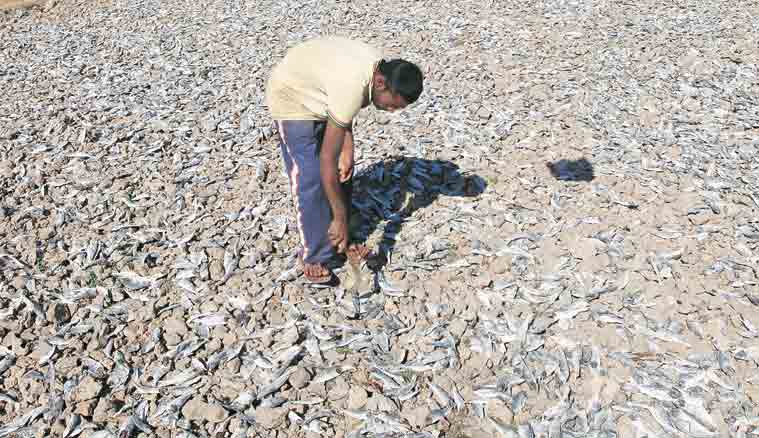
Merubhai Majithia, 35 and captain of a trawler, says the deep sea and the invisible border still give him the jitters. He has had at least one close encounter with a Pakistani boat. “I have only studied up to Class IV and don’t know how to use the GPS on my boat. Five years ago, when I saw a Pakistan Maritime Security Agency (PMSA) vessel near the border, I quickly took a a U-turn and returned to safer waters,” he says. More than the danger of being nabbed by Pakistani security agencies or kidnapped by a Pakistani boat, he is “afraid of the storms”.
Ganesh Soneri, a 30-year-old trawler captain, says fishermen on both sides of the border share “an understanding”. “I have never crossed the IMBL because I can operate the GPS. But even if we get too close to the border where Pakistani navy boats are patrolling, their fishermen tip us off. We too return the favour,” he says.
Soneri, who has been fishing for 15 years, understood “the risks of the business” four years ago when his cousin Ramesh Bamaniya was caught by the Pakistanis. “He was caught off the Jakhau coast. I was in the sea off Okha when he called me on his wireless set, crying and telling me about his ordeal. He was released within a year,” he says.
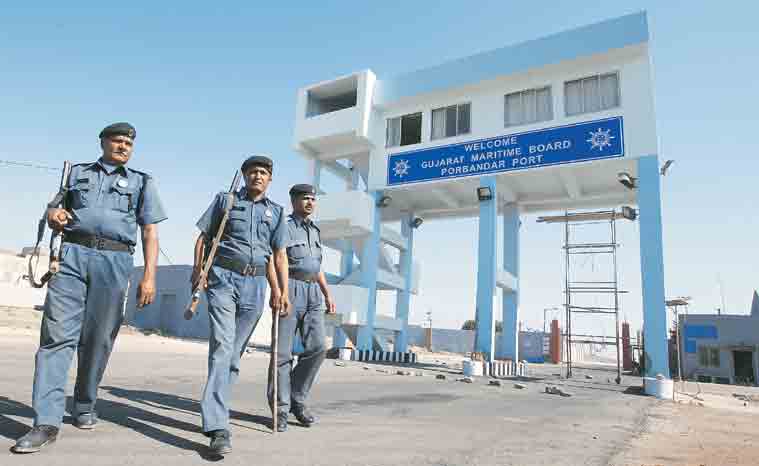
In the first five months of the ongoing fishing season which began in August, as many as 246 fishermen of Gujarat on board 41 boats were arrested by Pakistan. Though Gujarat has a 1,600-km coastline, and several ports, most of the fishermen arrested belonged to Porbandar. Of the 41 boats intercepted, 28 were registered in Porbandar, and of the 246 fishermen caught, 166 were from Porbandar. And yet, most of these arrests were made not off the Porbandar coast, but off Jakhau, where maritime borders are disputed. On the other hand, boats registered in Jakhau port hardly get caught by Pakistan.
“There is abundant fish in the Jakhau coast, so fishermen don’t need to go near the IMBL,” says a fisheries officer posted in Bhuj, the district headquarters of Kutch.
Fewer Pakistani boats get intercepted in Indian waters — so far this fishing season, there have been three by the BSF and five by the Coast Guard. The reason: More Indian fishermen venture into Pakistani waters for a better catch.
Ashok Gohel, who owns a trawler, says his crew “explores faraway waters since there isn’t enough fish near the coast.”
“Over the last decade, the catch of costly varieties such as pomfret, surmai and lobsters has gone down drastically. It’s all because of the pollution along the Porbandar coast,” he says.
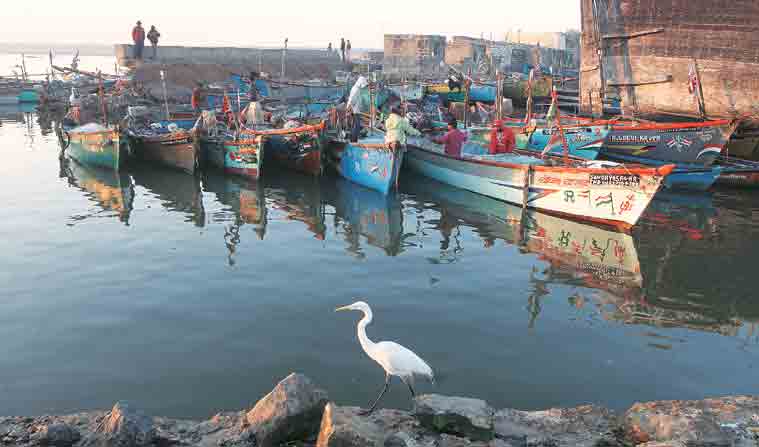
Karyabhai Jungi, president of the Porbandar Fishermen’s Boat Association, blames the “many factories that have come up on this line” for the pollution. “Because of these polluting units, our catch gets depleted and fishermen from Porbandar have to fish near the IMBL,” he says.
“Overfishing” near the coast is also pushing fishermen too close to the maritime border. “The state government stopped issuing new fishing licences in 2003. But people are getting new boats built with renewed licences. So, the number of trawlers has been increasing every year,” says Karsan Chamadia, who owns a trawler and is secretary (Gujarat) of the All India Exporters’ Association, a body of sea-food exporters.
He says the trawlers disturb the marine ecosystem. “The trawl scrubs the seabed, damaging the marine habitat. Despite the state government’s ban on using nets with holes smaller than four millimetres, fishermen use nets with holes as small as two millimetres. Such nets catch baby fish and affect their entire life cycle,” he says.
On the other hand, says Chamadia, “Pakistani fishermen still use old methods of fishing and therefore their waters are richer. A good catch can earn the captain and crew a bonus amount besides their monthly salary,” he says. A boat captain earns Rs 15,000-20,000 a month while a fisherman earns Rs 6,000-8,000 a month along with his bonus.
However, frequent security advisories since 26/11 — the Kuber fishing trawler hijacked by Pakistani terrorists was from Porbandar — have dampened the fishermen’s earnings. “Our fishermen are now fishing cautiously even in Indian waters. Since 26/11, the catch has gone down progressively,” says Mavji Lodhari, who owns a trawler.
If an Indian boat is caught in the no-fishing zone, its licence is suspended for a year, and fishermen have to surrender their identity cards. If a boat is captured by Pakistani authorities, its registration gets cancelled.
Jatin Desai, general secretary of the Pakistan-India People’s Forum for Peace and Democracy, wants a “no-arrest policy” for fishermen straying into each other’s side. “A fishing trawler costs around Rs 50 lakh and fishermen arrested by either side languish in jail for years. This is terrible for their families. They should not be arrested,” he says.
But fishermen are now also aiding security agencies in intelligence. The Gujarat police formed the Fishermen Watch Groups after 26/11 to beef up intelligence gathering from the sea.
“Fishermen are the first to know about any suspicious activity at sea. Our watch groups have around 1,000 members — fishermen, boat owners and their associations,” says Vishal Patel, police sub-inspector of Navi Bandar Marine police station.
ANCHORED TO SAFETY?
After the 26/11 attacks, for which Pakistani terrorists abducted a boat from Porbandar, Gujarat, the Gujarat police set up 21 marine police stations across the coasts of Jamnagar, Porbandar, Veraval, Bhavnagar, Amreli, Junagadh, Gir-Somnath, Devbhoomi Dwarka, Bharuch, Valsad, Navsari, Surat and Bhuj. The marine police is the first line of defence on the 1,600-km-long Gujarat coastline.
The marine police patrol the coastline, up to five nautical miles from the shore. That’s seven nautical miles short of the designated 12 due to lack of enough boats and personnel. The Indian Coast Guard protects the next 50 nautical miles, and the Indian Navy covers the 200 nautical miles till the International Maritime Boundary Line.
The Gujarat Marine Task Force, set up by the state government in 2011, has 200 trained commandos drawn from the State Reserve Police Force. On January 5, following the Pakistani boat explosion,173 commandos were deployed at coastal districts and will continue to stay put there till the Vibrant Gujarat Summit ends on January 13.
— Ujjwala Nayadu
Must Read
Apr 19: Latest News
- 01
- 02
- 03
- 04
- 05















